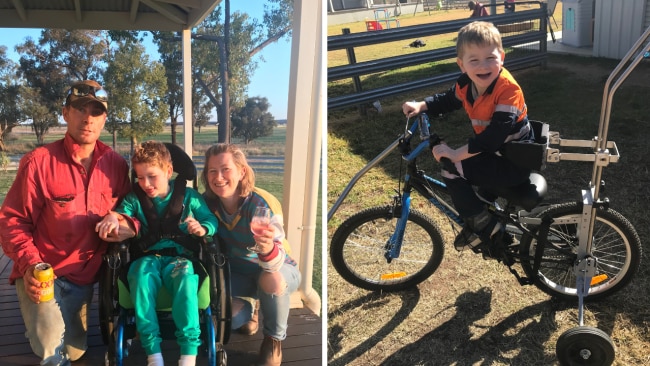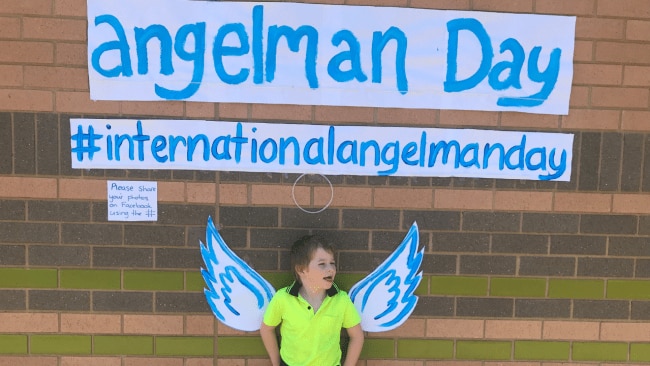‘It took 8 months - and my baby almost dying - for the diagnosis I battled for’
A NSW mum-of-three faced losing her baby boy before doctors finally realised he had more than a common virus.
Lifestyle
Don't miss out on the headlines from Lifestyle. Followed categories will be added to My News.
Throughout most of her pregnancy with son, Ted, Sarah had a “feeling” something wasn’t right, but there was nothing that she or the doctors could find.
Following her full-term delivery, however, the mum from Gilgandra, NSW, noticed something that should have been a potential red flag to medical professionals.
“I was aware on day three of Ted’s life that he had an uncoordinated suck while he was breastfeeding and he couldn’t take a bottle, either,” the 38-year-old tells Kidspot.
“He also couldn’t hold a dummy in his mouth. He would drool so much while he fed it that it would drench both of us in milk. But I had a really difficult breastfeeding journey with my first baby, so I just thought it was normal because my standards were so low.
“The midwives weren’t concerned, so I Iet it go. He also barely slept but I was told that was ‘normal’ too. I wasn’t able to bond with him like my first and I thought, ‘Maybe he doesn’t like me?’ He struggled so much to regulate back then. Looking back, I don’t know how we survived it all.”
Want to join the family? Sign up to our Kidspot newsletter for more stories like this.

The basic milestone missed
Having achieved other milestones without issues, Sarah and husband, Tim, became concerned when Ted was not yet sitting up at six months old. His eyes were also turning in intermittently.
“I wanted to tell myself that I was overreacting,” Sarah recalls emotionally.
“To get the strength to admit to myself that something really was wrong was hard. It was a very confusing time - wanting to know [what was wrong] yet hoping everything would be okay.”
While Sarah now knew Ted needed help, medical professionals failed to take his symptoms seriously for months.
“They kept telling me it would all be alright, that he just needs more time,” she says, tears welling up.
“But I would leave the hospital seeing people in wheelchairs and I knew that was where we were heading.”
RELATED: Mum’s heartbreaking diagnosis after IVF journey
Sarah made several GP appointments for a paediatric referral, with all turning her away, saying that Ted’s symptoms did not “warrant concern”.
Desperate for answers, she took her then eight-month-old baby to a paediatric physiotherapist known through a family member, which was a three-hour drive away from the rural farming property she lived on.
“She confirmed that what was going on with Ted wasn’t right,” Sarah says.
“His gross and fine motor skills were not where they should have been.”
Ted would be seen by various doctors in the coming months for illnesses such as bronchiolitis, but nothing more than his surface symptoms were ever investigated.
“I had a snowball of anger and frustration building inside of me from not being heard,” Sarah says emotionally.

Another doctor's visit
By the time his first birthday came, Ted was not crawling or walking, but had managed to sit up.
Sarah, who was also caring for her two-year-old daughter, Grace, became alarmed when she noticed Ted falling back from his sitting position.
“He had done it before, but this time, I took him to the doctor to get checked out,” the cautious mum remembers.
“When I left home, I never thought it was an emergency. But by the time I got him out of the car he was floppy and unresponsive.”
Yet again, Ted was discharged from the hospital he was transferred to, with doctors telling Sarah her son was “fine”.
That time, she did not accept their prognosis and demanded to stay.
It was that action that led Ted, then aged 14 months, to undergoing genetic testing which confirmed Sarah’s worst fears.
The little boy was diagnosed with Angelman syndrome (AS), a genetic disorder causing developmental disabilities and nerve-related symptoms for which there is no cure.
“I burst into tears and was heartbroken,” Sarah says, her voice shaking.
“It felt like the most cruel thing ever.”
Introducing our new podcast: Mum Club! Listen and subscribe wherever you get your podcasts so you never miss an episode.
The most frightening part of Ted’s diagnosis has been the added complication of epilepsy.
“A simple illness like colds and flus, or having constipation can trigger a seizure, and a seizure can kill him,” Sarah says.
One day, it came all too close to taking her baby boy away.
“He was face down on the bed, convulsing,” she says of that horrific day etched in her memory.
“He vomited and aspirated into his lungs and he was resuscitated and put into a coma. He was lifeless. I didn’t know if he was going to survive - neither did the doctors. All they could do was hug me. As his mother there was nothing I could do. It was torture.”
When Ted miraculously emerged from his 10-day coma, what happened next delivered a milestone Sarah never expected.
“He is non verbal, and he said ‘Mum’ for the first time as he came out of sedation,” Sarah cries.
“It was the opposite feeling of what it was meant to be. He just kept saying it, and it broke my heart because he wanted his mum so much that he did that. It was so sad.”
RELATED: Toddler receives devastating cancer diagnosis

A true, living angel
For Sarah, the 8-month struggle to have her sick child diagnosed has cost her family everything.
“If we had known earlier, we could have had him medicated and had him monitored, instead of being in a life and death situation.”
During the coma, Sarah also discovered she was pregnant with her third child - who would go on to be born without AS.
Six-year-old Ted, who attends school three days per week, remains an inspirational and lovable son and brother to his parents and siblings, Grace, 7, and Roy, 3.
For Sarah, seeing Ted’s precious milestones since his diagnosis have taken on a whole new meaning.
“He was almost two years old when he let me hug him without him pushing back,” the tear-filled mother-of-three says.
“That meant so much to me. He has the best laugh you will ever see. His hugs and kisses are so purely genuine. His ability to love without judgement is everything, and there is so much kindness in his eyes. He just wants affection and that brings me so much joy. AS kids really are ‘angels’. Ted has made us all into better people and he has completely changed the way we look at the world.”
Angelman syndrome is estimated to affect one in 15,000 people worldwide. In Australia, over 500 people are living with AS although research suggests there are over 1000 'missing angels' who remain undiagnosed or misdiagnosed as symptoms present in the same way as cerebral palsy and autism. The Foundation of Angelman Syndrome Therapeutics (FAST) is holding a ‘spring challenge’ to raise awareness and funds for AS research and support. Participants can kick off their challenge any day during spring and take on anything that challenges them for 15, 30 or 45 days.
More Coverage
Originally published as ‘It took 8 months - and my baby almost dying - for the diagnosis I battled for’





